On June 23…
“I must say I found you disappointing; I mean your incompetence. You left enough clues to sink a ship. And for a man of your intelligence, you got caught in a lot of stupid lies.”
~Peter Falk (as Columbo)
‘How To Dial A Murder’

1892 – The Democratic convention in Chicago nominated former President Grover Cleveland on the first ballot.
Cleveland, elected as president in 1884, had lost his re-election bid to Benjamin Harrison four years earlier. He would go on to win the 1892 election, making him the only president to serve two non-consecutive terms (the 22nd and 24th president).
Presidential Trivia: Cleveland won a plurality of the popular vote in his losing bid in 1888, but Harrison won the election with a majority in the Electoral College.
Sound familiar?
Four other presidents have won an election despite losing the popular vote: John Quincy Adams in 1824, Rutherford Hayes in 1876, George W. Bush in 2000 and Donald Trump in 2016.
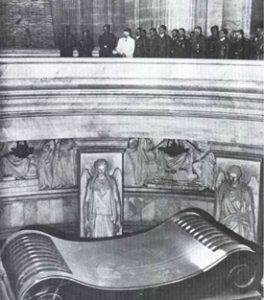
1940 – Adolf Hitler, accompanied by architect Albert Speer, made his first and only visit to Paris.
Although his visit is usually associated with viewing the Eiffel Tower, Hitler (white suit in photo above) made visiting Napoleon’s tomb a priority. As he left, he said, “That was the greatest and finest moment of my life.”
Comparisons between Hitler and Napoleon have been made many times: They both planned invasions of Russia while preparing invasions of England at the same time; both captured the Russian city of Vilna on June 24; both had photographic memories; both were under 5 feet 9 inches tall … and both gambled and lost everything they had.
Hitler may have been overwhelmed by his visit to Napoleon’s tomb, but he wasn’t as impressed with two other French memorials.
He ordered the destruction of two World War I monuments: one to General Charles Mangin, a French war hero, and one to Edith Cavell, a British nurse who was executed by a German firing squad for helping Allied soldiers escape German-occupied Brussels.
The last thing Hitler wanted were such visible reminders of past German defeat.

1942 – One of Germany’s latest fighter aircraft practically fell out of the sky into the hands of the Allies.
The Focke-Wulf 190Fw had only recently arrived with front line units and its superior performance had caused the Allies so many problems that they were considering mounting a commando raid on a French airfield to capture one for evaluation.
They didn’t need to.
Armin Faber, a German Luftwaffe pilot, was returning from a bombing mission but became disoriented and mistook the Bristol Channel for the English Channel and flew north instead of south. Thinking he was in France, he turned towards the nearest airfield … RAF Pembrey in South Wales.
Observers on the ground could not believe their eyes as Faber waggled his wings in a victory celebration, lowered the Focke-Wulf’s undercarriage and landed.
The aircraft was immediately tested to reveal any weaknesses that could be exploited.
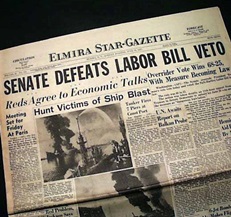
1947 – The Senate, by a 68 to 25 vote, overrode President Harry Truman’s veto of the Taft-Hartley Labor Bill.
Labor leaders called it the “slave-labor bill” while President Truman argued that it was a “dangerous intrusion on free speech.”
The Act pushed for changes on three fronts. In an early manifestation of McCarthyism, the law required union officers under the National Labor Relations Board’s jurisdiction to submit anti-communist affidavits.
It tipped the scales in labor disputes by dispensing with the expectation of management neutrality and prohibiting a range of “unfair labor practices” – including jurisdictional strikes, secondary boycotts or pickets, and wildcat strikes.
And it opened the door for individual states to outlaw “union security” provisions (which required workers in unionized shops to join and pay dues to the union) through the passage of what became known as right-to-work laws.
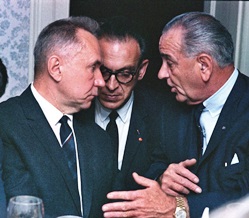
1967 – Hopes for better U.S.-Soviet relations ran high as President Lyndon Johnson met with Soviet Premier Aleksei Kosygin in Glassboro, New Jersey, for a three-day summit. The meeting ended inconclusively, however, as issues such as the Middle East and Vietnam continued to divide the two superpowers.
The Soviets proved inflexible on the major issues. They branded the Israelis as the aggressors in the Middle East and demanded that Israel evacuate the lands seized during the Six-Day War. Concerning Vietnam, the Soviet stance was plain: peace would come when the United States left Vietnam.
The talks were supposed to continue during a Johnson visit to the Soviet Union in 1968, but a brutal Soviet invasion of Czechoslovakia to crush the “Prague Spring” revolution led to the cancellation of that trip.

1972 – Title IX of the education amendments of 1972 was signed into law by President Richard Nixon. Title IX prohibited federally funded educational institutions from discriminating against students or employees based on sex.
As a result of Title IX, any school that receives any federal money from the elementary to university level – in short, nearly all schools – must provide fair and equal treatment of the sexes in all areas, including athletics.
Before Title IX, few opportunities existed for female athletes. The NCAA offered no athletic scholarships for women and held no championships for women’s teams. Furthermore, facilities, supplies and funding were lacking. As a result, in 1972 there were just 30,000 women participating in NCAA sports, as opposed to 170,000 men.
Since the enactment of Title IX, women’s participation in sports has grown exponentially.
In high school, the number of girl athletes has increased from just 295,000 in 1972 to more than 2.8 million. In college, the number has grown from 30,000 to more than 170,000.
And it was these 37 words that changed everything: “No person in the United States shall, on the basis of sex, be excluded from participation in, be denied the benefits of, or be subjected to discrimination under any educational program or activity receiving Federal financial assistance.”
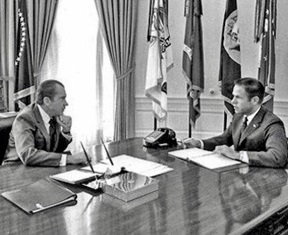
1973 – The Smoking Gun Conversation…
An audio tape of a conversation in the Oval Office between President Richard Nixon and his advisor, H.R. Haldeman, proved that Nixon ordered a cover-up of a burglary six days after the break-in at the Democratic National Committee headquarters at the Watergate office complex.
During the conversation, Nixon listened to Haldeman’s suggestion that administration officials should approach Vernon A. Walters, Deputy Director, and ask him to request L. Patrick Gray, Acting Director of the FBI, to halt the Bureau’s investigation into the Watergate break-in on the grounds that it was a national security matter.
Haldeman: “That the way to handle this now is for us to have Walters call Pat Gray and just say, ‘Stay the hell out of this…this is ah, business here we don’t want you to go any further on it.’ That’s not an unusual development.”
Moments later, after further discussion, Nixon said, “All right, fine, I understand it all… Good. Good deal! Play it tough. That’s the way they play it and that’s the way we are going to play it.”
In essence, Haldeman was telling Nixon to commit a crime and the president agreed with him. Special prosecutor Leon Jaworski felt that Nixon, in so agreeing, had entered into a criminal conspiracy whose goal was the obstruction of justice.
Once the “smoking gun” tape was made public on August 5, 1974, Nixon’s political support vanished. The ten Republicans on the House Judiciary Committee who had voted against impeachment in committee announced that they would now vote for impeachment once the matter reached the House floor.
Nixon lacked substantial support in the Senate as well; Barry Goldwater and Hugh Scott estimated no more than 15 Senators were willing to even consider acquittal.
Facing certain impeachment in the House of Representatives and equally certain conviction in the Senate, Nixon announced his resignation on the evening of Thursday, August 8, 1974, effective as of noon the next day.

1993 – Lorena Bobbitt of Manassas, VA sexually mutilated her husband, John, after he allegedly raped her.
After her husband had gone to sleep, Lorena grabbed a knife from the kitchen, entered their bedroom, and removed her husband’s penis at its base. She left the apartment with the severed appendage and drove away in her car.
After driving a short distance, she threw it into a field, but after realizing the severity of her crime, she stopped and called 9-1-1. Her husband’s penis was found after an exhaustive search, and it was reattached in the hospital where he was treated. The operation took nine and a half hours.
At her ensuing trial, a jury found Lorena not guilty due to insanity, causing an irresistible impulse to sexually wound John. The couple divorced in 1995.
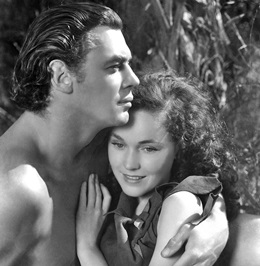
1998 – Actress Maureen O’Sullivan died of complications from heart surgery. She was 87.
Although she had roles in films such as Hannah and Her Sisters (appearing with her daughter, Mia Farrow), A Day At The Races, and Anna Karenina, she is best known for playing the role of Jane in six Tarzan films with Johnny Weissmuller.
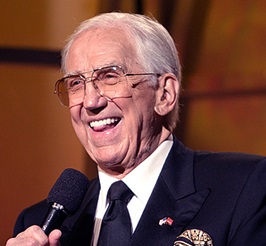
2009 – Ed McMahon died at the age of 86.
He was the host of the original Star Search and TV’s Bloopers & Practical Jokes, but is best known as Johnny Carson’s sidekick on NBC’s The Tonight Show Starring Johnny Carson for thirty years,
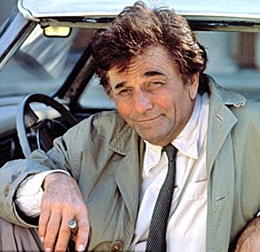
2011 – Actor Peter Falk died of cardiorespiratory arrest, with pneumonia and complications of Alzheimer’s disease being secondary and underlying causes. He was 83.
Although he will forever be remembered for his role as Lieutenant Columbo in the television series Columbo (for which he won four Primetime Emmy Awards), Falk was twice nominated for an Academy Award for Best Supporting Actor (Murder, Inc. and Pocketful of Miracles).
He also had featured roles in It’s A Mad, Mad, Mad, Mad World, Anzio, The In-Laws and Murder By Death.
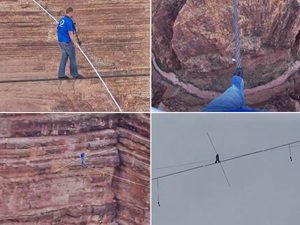
2013 – 34-year-old aerialist Nik Wallenda became the first person to walk a high wire across the Little Colorado River Gorge near Grand Canyon National Park in Arizona.
Wallenda wasn’t wearing a safety harness as he made the quarter-mile traverse on a 2-inch-thick steel cable 1,500 feet above the gorge.
One year earlier, Wallenda, a member of the famous Flying Wallendas family of circus performers, had become the first person to walk a tightrope over Niagara Falls.
Compiled by Ray Lemire ©2019 RayLemire.com. / Streamingoldies.com. All Rights Reserved.